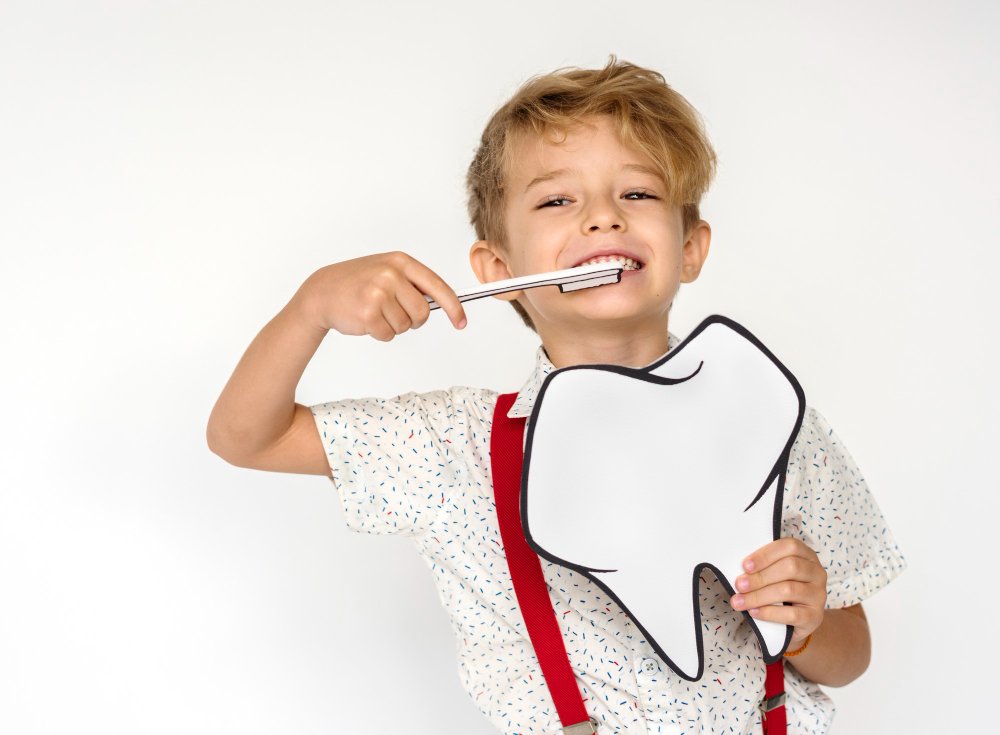As parents, we strive to provide the best care for our children, and their oral health should be a top priority. Establishing good oral hygiene habits early on can set the foundation for a lifetime of healthy teeth and gums. In this blog, we will discuss essential tips for caring for your child’s teeth and ensuring their dental well-being.
1. Start Early:
Good oral care begins even before your child’s first tooth erupts. Clean your baby’s gums with a soft cloth or infant toothbrush after feeding to remove bacteria and prevent plaque buildup. Once the first tooth appears, usually around six months, start brushing with a small, soft-bristled toothbrush and a smear of fluoride toothpaste. Gradually increase the amount of toothpaste to a pea-sized amount by age three.

2. Encourage Proper Brushing Technique:
Teach your child the proper brushing technique from an early age. Show them how to hold the toothbrush at a 45-degree angle and gently brush in circular motions to clean all tooth surfaces, including the front, back, and chewing surfaces. Encourage them to brush for at least two minutes, twice a day. To make brushing fun, consider using a toothbrush with their favorite cartoon character or playing their favorite song while they brush.
3. Promote Healthy Eating Habits:
Diet plays a significant role in oral health. Encourage your child to consume a well-balanced diet that includes a variety of fruits, vegetables, whole grains, and lean proteins. Limit their intake of sugary snacks, sodas, and sticky candies, as these can contribute to tooth decay. Instead, provide healthier snack options like fresh fruits, cheese, yogurt, and nuts. Also, ensure they drink plenty of water, which helps rinse away food particles and keeps their mouth hydrated.
4. Schedule Regular Dental Checkups:
Regular dental checkups are crucial for your child’s oral health. Plan their first dental visit around their first birthday or as soon as their first tooth appears. Regular checkups allow the dentist to monitor their dental development, detect any early signs of dental issues, and provide preventive treatments such as fluoride applications and dental sealants. Additionally, dental visits create a positive association with oral care and help alleviate any dental anxiety they may have in the future.
5. Teach Proper Flossing Technique:
Flossing is an essential part of maintaining good oral hygiene. As soon as your child’s teeth touch each other, introduce flossing into their routine. Teach them how to use a child-friendly flossing tool or floss picks to clean between their teeth. Encourage them to floss at least once a day, preferably before bedtime. Flossing removes plaque and food particles from areas that a toothbrush cannot reach, preventing cavities and gum disease.
6. Be a Role Model:
Children often learn by observing their parents’ behavior. Set a positive example by practicing good oral hygiene yourself. Let them see you brushing and flossing regularly, and make it a family activity. Encourage them to join you in taking care of their teeth, and emphasize the importance of oral health. When they see that oral care is a priority for the whole family, they are more likely to develop good habits and take responsibility for their own dental health.
7. Use Fluoride to Strengthen Teeth:
Fluoride is a mineral that helps strengthen tooth enamel and prevent tooth decay. Ensure your child receives an adequate amount of fluoride by using a fluoridated toothpaste and drinking fluoridated water if it is available in your area. However, it’s important to use fluoride toothpaste in an appropriate amount for your child’s age to avoid excess ingestion, which can cause fluorosis. Consult with your dentist for guidance on the right
Conclusion:
Caring for your child’s teeth is an essential part of their overall health and well-being. By following these tips, you can establish good oral hygiene habits and promote a lifetime of healthy smiles for your child.
Starting early with proper oral care, including gentle gum cleaning and brushing as soon as the first tooth appears, sets the foundation for a healthy mouth. Teaching your child the correct brushing and flossing techniques and making it a fun and interactive experience will help them develop good habits and ensure thorough cleaning of their teeth.
Promoting a healthy diet that is low in sugary snacks and beverages and high in fruits, vegetables, and whole grains not only benefits their overall health but also reduces the risk of tooth decay. Additionally, regular dental checkups are essential for monitoring their dental development, addressing any concerns early on, and providing preventive treatments.
As a parent, being a positive role model by practicing good oral hygiene yourself and involving the whole family in oral care routines fosters a sense of responsibility and encourages your child to prioritize their oral health.
Remember to use fluoride toothpaste in appropriate amounts and consult with your dentist for guidance on fluoride usage and the right dental products for your child’s age.
By incorporating these tips into your child’s daily routine and making oral care a priority, you are setting them up for a lifetime of healthy teeth and a confident, beautiful smile.


